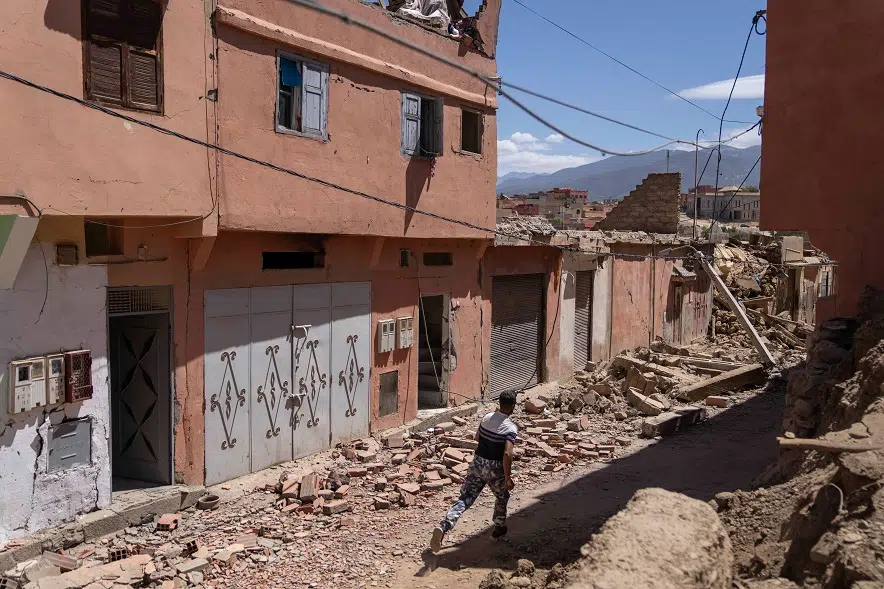A devastating earthquake hit the north-African country of Morocco on Friday, leaving nearly 2,500 people dead.
The 6.8-magnitude quake happened in the Moroccan High Atlas Mountains, southwest of Marrakesh, and could be felt in several major centres.
Dr. Roy Rule is a geological scientist who previously lived and studied in Saskatoon, and now works as the resident geologist at Tumbler Ridge UNESCO Global Geopark. Rule said he was asleep on the fourth floor of a Marrakesh hotel when the quake hit.
“I actually got thrown out of bed, landed on the floor, and my initial response was, ‘Oh God, there’s been a bomb,’ before thinking ‘No, wait, a truck has hit the building,’ and then realizing it was an earthquake,” Rule said, speaking to 650 CKOM from Africa by phone.

Earthquake damage was visible around Marrakesh following the devastating earthquake. (Roy Rule/Submitted)
“I’ve been in two other minor earthquakes – both around five on the (Richter) scale – but this was the strongest that I’ve been in.”
He said the quake lasted about 45 seconds, and he got himself into a doorframe for safety in case parts of the building collapsed.
“The noise level was equivalent to standing next to a jet aircraft. The entire place was shaking,” he said.
Rule was in Morocco along with 15 other Canadians for the UNESCO Global Geoparks Conference. When the quake hit, he said he quickly met up with the other attendees and they all got clear of the building as quickly as they could.
“The geologists on the floor above me, they had things flying off tables, and basically we all got into a corridor and were just looking at the walls cracking,” he said. “(There was) only minor plaster damage, really, inside our hotel, and then we all ran downstairs.”
Rule said he and the other Canadian scientists “spent the night outside on a patio outside a café,” because the hotel needed a civil engineer to certify its safety before people could be allowed back inside. In other parts of the city, however, the situation was much more dire.
“All the hotels in our area only had minor damage,” Rule said. “Some German geologists who were staying in the old quarter got trapped within the building, and two members of the Cliffs of Fundy Geopark were walking through the old quarter when buildings began collapsing around them.”
Rule said the hotel he was staying in and other buildings in the neighbourhood were newer structures that didn’t suffer much damage beyond the superficial, but other areas were not so fortunate.
“There are still people sleeping in the streets, especially around the older quarters, because they don’t trust going back into the buildings,” he explained.
“And around the medina there are literal shops collapsed. A lot of the small buildings over there are literally destroyed, but nothing compared to what happened up in the mountains.”
Rule said he saw part of the government response, and some members of the geology conference – which was being held in the country by sheer coincidence – were able to use their expertise to help out as well.
“On the night of the earthquake, there were six or seven convoys of army trucks, police and ambulances moving people from the old quarters to bigger hospitals. The UNESCO crew all gave blood, if we were able to, and we were basically placed in our little conference centre,” he said.
“They actually sent out geology specialists to certain areas to help out with earthquake-safety procedures … The main crew from Greece all specialize in earthquake prevention and rescue.”
Rule said he expects to fly out of the country soon.
“Most of the Canadians decided not to change flights because there were people more in need. Because our hotel was given the go-ahead to be reopened, we all hunkered down,” he said. “Most of us are leaving tomorrow morning.”
From a geological perspective, Rule said it’s unusual for such a major earthquake to happen so far inland, and that fact may have contributed to the severity of the damage.
“It was a strange earthquake for the fact that most of the time they happen along the coast due to the continental rift between Africa and Spain, so this one occurring inland was scientifically unexpected, so that’s one of the reasons why it was so devastating,” Rule explained.
“They get earthquakes here on a regular basis, but never this strong.”
— With files from The Canadian Press







